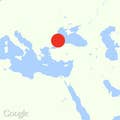
ISTANBUL — Syria’s armed rebel groups and the regime of Bashar al-Assad signed a nationwide truce to take effect at midnight Friday in a deal backed by Turkey and Russia that could stop or at least temporarily slow the country's devastating and destabilizing five-year civil war.
The ceasefire would precede talks for a broader political settlement to begin in about a month in Astana, the capital of Kazakhstan, building on the deal to evacuate civilians and rebels from the city of Aleppo, according to officials. The deal represents a big diplomatic blow for the US and its allies, as Russia angles to grow its Middle Eastern influence and entice Turkey away from the US.
“This agreement will be serious this time after the assurances that we have received from the guarantors, and there will be results on the ground,” Faris Bayoush, director of political and foreign relations for the Idlib Free Army, a rebel group, told BuzzFeed News.
"The arrangement aims to expand the ceasefire in Aleppo to other parts of Syria, secure uninterrupted humanitarian assistance and revitalize the political process,” Ibrahim Kalin, spokesman for Turkish President Recep Tayyip Erdogan, said in a statement. “The president will continue to work toward the success of the Astana process.”
The Syrian conflict began in 2011 after Assad regime security forces opened fire on peaceful protesters demanding political reform and began mass arrests of political dissidents. It has devolved into a vicious civil war that has left half a million dead and displaced more than 11 million, sending abroad waves of refugees that have fueled the rise of far-right political parties in the West. Russia, Iran and Shia militias from Lebanon and Iraq came to the aid of Assad while Turkey, the US, France, the UK and the Gulf states supported the rebels, an often fractious umbrella that ranged from defectors from the Syrian army to Islamist militants.
A Syrian rebel spokesman said the deal included a release of detainees and aid for besieged areas but no documents have yet been made public. The truce followed a flurry of diplomatic maneuvers that notably excluded the US and its partners, all of which have supported the Syrian rebels.
The deal's timing reflects the weakness of the Syrian rebel groups after their loss of eastern Aleppo as well as Ankara’s disappointment with President Obama, whose administration has supported Syrian Kurdish militias fighting ISIS over Syrian Arab rebels that are Turkey’s allies.
Russia appears to have jumped at the chance to use the Syria conflict to woo Turkey, a member of NATO, away from the US, which sells Turks weapons and operates the large Incirlik air base, a key node in US operations against ISIS. Russia’s defense minister Sergei Shoigu disclosed Thursday that Moscow has been using Turkey as a mediator in talks with moderate rebel groups representing 60,000 fighters for at least two months. In a meeting with top officials on Thursday, Russian President Vladimir Putin appeared to relish the prospect of resolving a conflict that the US, UN, and European Union have failed for years to solve.
“The Russian, Turkish and Iranian foreign ministers recently held a trilateral meeting in Moscow, at which all three countries committed themselves to not simply monitoring but also guaranteeing the peace process in Syria,” Putin was quoted as saying. “We realize that the agreements reached are very fragile and require particular attention, patience, a professional approach to the issues, and constant contact with our partners in the region.”
Even if the deal is implemented, Syria’s troubles are far from over. The deal includes some of the most important rebel groups in Syria’s north and central provinces but excludes ISIS, the jihadi group which has been battling all parties in the country to establish an Islamic utopia. Turkey says the deal does not include Syrian Kurds, which it and its Arab allies are battling intermittently in the north.
Russian and Turkish officials said the deal includes mechanisms for monitoring the truce but disclosed no details. Russia, the Assad regime and the motley collection of mostly foreign militias that prop it up have a history of violating previous truces. The US and its allies have repeatedly accused Russia and Assad’s forces of war crimes against civilians, including attacking a UN convoy delivering aid. Rebels have also been accused of using ceasefires to build up weapons stores and ease into strategic positions ahead of the next round of fighting. “Our fingers will be on the trigger during the implementation of the ceasefire agreement,” Osama Abu Zaid, a spokesman for the Free Syrian Army, said during an appearance on Al Jazeera.
Perhaps most perilously, there appear to be continued disagreements about the status of Jabhat Fatah al-Sham, the successor to the Al Qaeda linked Jabhat al-Nusra rebel group which controls a large section of Idlib province in the northwest. Iranian and Syrian media said the truce excludes the group and its allies, while rebels said the truce also covers Jabhat Fatah al-Sham, which was not among more than half a dozen rebel groups that reportedly signed onto the deal.
“Most of the Free Syrian Army factions in the north signed the agreement except Fatah al-Sham, but they are included after we have put pressure on international powers to include them,” said Bayoush, the Idlib Free Army official. “They overlap on us and on civilians, and any bombing of them will result in massacres of civilians.”


